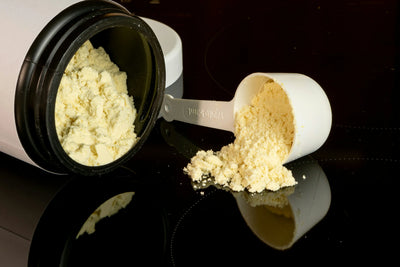Introduction
As pet health awareness grows, more and more dog owners are focusing on natural supplements, with goat's milk becoming a “pet superfood” for many due to its nutritional richness and potential health benefits. Whether as a tasty snack or a nutritional supplement, goat's milk is highly prized.
Goat Milk for Dogs: Is It Safe? Nutrition Facts & Who Should Try It
However, is goat's milk really suitable for every dog? What are its nutritional values? And how should it be fed properly? This article will delve into these questions to help pet owners make informed choices and keep their dogs healthy while enjoying the flavor.

1. Goat's milk is a treasure trove of nutrients: what does it bring to your dog?
As a natural source of nutrition, goat's milk contains a variety of ingredients that are beneficial to your dog's health. Here are the main nutritional highlights of goat's milk:
High Quality Protein
Goat's milk is rich in high-quality protein, the cornerstone of your dog's muscle, skin and coat health. Protein not only supports growth and development, but also helps maintain body functions in adult dogs, making it especially suitable for active dogs or pets in recovery.
Natural Sources of Vitamin A
Vitamin A is vital for your dog's skin, coat, muscles and nervous system. The natural vitamin A in goat's milk helps dogs maintain a shiny coat and healthy skin, and is especially beneficial for dogs with sensitive skin.
Rich in Calcium
Compared to cow's milk, goat's milk has a higher calcium content, which helps to strengthen your dog's bones and teeth. For puppies, older dogs or dogs with weak bones, goat's milk can be a good source of calcium.
Probiotic “Gut Guardian”
Goat's milk naturally contains probiotics, which can help regulate your dog's intestinal flora, improve digestion, and reduce bloating or constipation. This is especially important for dogs with sensitive stomachs.
Other Trace Elements
Goat's milk also contains a variety of micronutrients such as vitamins B6, B12, folic acid, iron, copper and zinc. These ingredients work together to support your dog's overall health, from the immune system to blood circulation, and nourish it fully.
2. 5 Health Benefits of Goat's Milk: “Nutritional Magic” for Dogs
Goat's milk is not only nutritious, but it also offers a wide range of health benefits for dogs. Here are the five advantages of goat's milk for dogs:
Mild and easy to digest
Compared to cow's milk, goat's milk has a lower lactose content and smaller fat particles, making it easier for dogs to absorb. Goat's milk is a gentle alternative for dogs with lactose intolerance, reducing the risk of diarrhea or bloating.
Promotes intestinal health
The probiotics in goat's milk balance the intestinal flora, reduce inflammation, and improve digestive issues. Some veterinarians even recommend using goat's milk for dogs with inflammatory bowel disease or chronic digestive issues to help ease discomfort.
Boosts the immune system
A healthy gut is the first line of defense for the immune system. By improving gut health, goat's milk indirectly boosts your dog's immune system, allowing them to better fight off illnesses, making it especially suitable for weaker puppies or older dogs.
Hydration to aid recovery
Goat's milk has a high water content and can be used as a tasty form of hydration. For dogs that are sick, recovering from surgery, or prone to dehydration, goat's milk not only hydrates, but also provides additional nutritional support.
For a shinier coat
The vitamin A and fatty acids in goat's milk moisturize the skin, reduce dryness and itching, and give your dog's coat a softer, shinier look. For long-haired dogs or breeds with sensitive skin, goat's milk may bring unexpected improvements.
3. Potential risks of goat's milk: not for all dogs
Despite the many benefits of goat's milk, not every dog can enjoy it without worry. Here are some potential risks to be aware of:
Risk of lactose intolerance
Although goat's milk contains less lactose than cow's milk, some dogs may still be sensitive to it and experience diarrhea, bloating or digestive discomfort. If your dog has a history of lactose intolerance, extra caution is needed.
High fat and calories
Goat's milk is about 4% fat and high in calories. If fed in excess, it can lead to weight gain and even pancreatitis in dogs, especially for dogs that are obese or at high risk of pancreatic problems, and intake needs to be strictly controlled.
Allergic reaction
A small number of dogs may be allergic to the proteins in goat's milk, manifesting as itchy skin, vomiting or diarrhea. If an abnormality is noticed after the first feeding, stop immediately and consult your veterinarian.
Risk of bacterial contamination
Raw goat's milk that has not been pasteurized may contain bacteria, such as Salmonella or Listeria, which pose a risk to your dog's health. Therefore, it is recommended to choose commercially available goat's milk products that have undergone rigorous treatment.
4. How to feed goat's milk safely: a guide to scientific feeding
In order for dogs to safely enjoy the benefits of goat's milk, pet owners need to follow these feeding principles:
Gradual and Observe the Response
When feeding goat's milk for the first time, it is recommended to start with a small amount, e.g. 1 teaspoon, and observe the dog's reaction (e.g. whether there is diarrhea, vomiting or discomfort) within 24 hours. If your dog adapts well, you can gradually increase to the right amount.
Control the intake and tailor it to your dog's needs
The amount of goat's milk fed should be adjusted according to the dog's weight, health condition and daily diet. For example, for a 22 kg adult dog, 100-150 ml of goat's milk per day is more appropriate. The amount for puppies or small dogs should be reduced accordingly to avoid excessive intake of fat and calories.
Choose quality products
Give preference to pasteurized goat's milk or goat's milk powder designed for pets to avoid the health risks associated with raw goat's milk. Also, make sure the product does not contain added sugar or other unnecessary additives.
Consult your veterinarian for personalized care
Every dog's health is different, and it's best to consult a veterinarian before adding goat's milk, especially for dogs with chronic illnesses, obesity, or a history of food allergies. The veterinarian can provide professional advice based on the specific needs of the dog.
5. Which dogs are suitable for goat's milk?
Goat's milk is not a necessity for every dog, but it may be an ideal choice in the following situations:
Puppies: Goat's milk can be used as a supplement to breast milk to help puppies get the nutrients they need to grow.
Older dogs: Goat's milk's easy-to-digest properties and high nutritional value are suitable for older dogs with weakened stomachs.
Dogs with sensitive stomachs: Goat's milk's low lactose and probiotic properties are especially friendly to dogs with digestive problems or lactose intolerance.
Skin or Coat Problems: The vitamins and fatty acids in goat's milk help improve dry skin or dull coats.
Recovering dogs: Whether recovering from surgery or during illness, goat's milk provides easily absorbed nutrients and hydration.
As a nutrient-rich natural food, goat's milk offers many potential health benefits for dogs, from improving digestion and immunity to a shinier coat. However, the high fat and calorie content, as well as the potential risk of lactose intolerance and allergies, remind us that feeding goat's milk needs to be done carefully and scientifically. By introducing it gradually, controlling intake, choosing a quality product and consulting with your veterinarian, goat's milk can be a healthy addition to your dog's diet, adding a splash of flavor and energy to their lives.
Whether your dog is an active miniature schnauzer, a recovering sickly dog, or a long-haired dog with a dull coat, goat's milk is likely to be a good companion on their journey to good health. When fed scientifically, goat's milk is not only safe, but it can also give your dog a big “woof” and a lot of energy!
Goat Milk Powder for Dogs vs. Fresh: Which is Better? (Pros & Cons)
Goat milk has become a new favorite among pet owners in recent years due to its rich nutrition and gentle nature on dogs' digestive systems. Whether it promotes digestion, enhances immunity, or improves hair luster, goat milk is regarded as a "nutritional treasure trove" for dogs. However, when faced with the choice between fresh goat milk and goat milk powder, pet owners often struggle: which one is more suitable for their dogs? This article will conduct a detailed comparison of the advantages and disadvantages of fresh goat milk and goat milk powder from multiple perspectives such as nutritional components, digestion and absorption, safety, and applicable scenarios, to help you find the best choice for your beloved dog.
1. Nutritional Content: Natural vs. Processed, How Much Difference Is There?
(1) Fresh Goat Milk: A Natural Nutritional Treasure
Fresh goat milk retains the natural nutritional essence of goat milk, rich in high-quality proteins, vitamin A, B6, B12, calcium, potassium, iron, zinc and other trace elements. These nutrients are crucial for the muscle growth, bone health and immune system of dogs. What's more, fresh goat milk contains natural probiotics and active enzymes, which can effectively promote intestinal health and improve digestive function. Its fat particles are smaller and the lactose content is lower than that of milk, making it particularly suitable for dogs with lactose intolerance. However, the nutritional components of fresh goat milk may slightly deteriorate due to storage conditions or time.
(2) Lamb milk powder: Concentrated nutrition, more flexible fortification
Sheep milk powder is produced by concentrating fresh sheep milk through dehydration. Although a small amount of active enzymes may be lost during the processing, the core nutrients such as protein, calcium and vitamins are generally retained. High-quality sheep milk powder is usually treated with pasteurization to ensure safety. It may also be fortified with probiotics, vitamin D or other nutrients to meet the specific health needs of dogs. For example, some sheep milk powders are specially designed for puppies or senior dogs to provide the necessary nutrients for growth or joint health. The nutritional stability of sheep milk powder is higher, making it suitable for long-term storage.

2. Digestion and Absorption: Which is More Gentle?
(1) Fresh goat milk: Gentle and easy to absorb
Fresh goat milk is very friendly to a dog's digestive system due to its low lactose content and tiny fat particles. Many dogs that are lactose intolerant will experience diarrhea or gas after drinking milk, but goat milk significantly reduces these risks. Its natural enzymes can also help break down nutrients and promote absorption. However, fresh goat milk needs to be stored in the refrigerator and has a shelf life of usually only a few days to a week. If not handled properly, it may go bad and affect the dog's eating experience.
(2) Goat milk powder: Flexible but requires reconstitution
The digestibility and absorption rate of goat milk powder are almost the same as those of fresh goat milk. Especially for high-quality products, during the processing, the natural characteristics of goat milk are retained as much as possible. The reconstituted goat milk powder has a similar taste and absorption effect to fresh goat milk, and can be easily mixed into dog food or water for convenient feeding. Its greatest advantage is that it does not require refrigeration and has a shelf life of several months or even a year, making it particularly suitable for families that do not frequently purchase fresh goat milk. However, when reconstituting, it is necessary to pay attention to the water temperature and ratio to ensure that the nutrients are not damaged.
3. Safety: Which Has A Lower Risk of Bacteria?
(1) Fresh goat milk: Safety requires caution
Unpasteurized fresh goat milk may contain harmful bacteria such as Escherichia coli and Salmonella, posing a threat to the health of dogs. Even if a dog's digestive system is more resilient than that of humans, bacterial infection can still cause symptoms like diarrhea and vomiting. Therefore, when choosing fresh goat milk, make sure to purchase genuine products that have undergone pasteurization and strictly follow the refrigeration storage requirements to avoid spoilage due to improper storage.
(2) Goat milk powder: Safer and more reliable
During the production process of goat milk powder, it is usually subjected to high-temperature pasteurization or spray drying techniques, which effectively kill harmful bacteria and make it safer. Its sealed packaging also reduces the possibility of external contamination, making it suitable for long-term storage and frequent use. For pet owners who are concerned about bacterial risks, goat milk powder is undoubtedly a more convenient choice.

Noora Daily Multi with 21 Beneficial Nutrients
4. Applicable Scenarios: Different Dogs Have Different Needs
(1) Fresh Goat Milk: The "Rain of Immediate Nourishment"
Fresh goat milk is particularly suitable for dogs that need to quickly replenish their nutrients, such as dogs in the post-operative recovery period, puppies with digestive problems, or elderly dogs with poor appetite. Its natural taste and high water content can also attract picky dogs, and it can be fed directly as a snack or as a "flavor enhancer" for dog food. Whether mixed into dog food or fed alone, fresh goat milk can provide immediate nutritional support for dogs. However, its short shelf life and refrigeration requirements may not be very convenient for busy pet owners.
(2) Goat milk powder: The "convenient choice" for long-term supplementation
The portability and long shelf life of goat milk powder make it an ideal choice for long-term nutritional supplementation. Whether it's for senior dogs that need to enhance their bone health or for weak dogs that need to boost their immunity, goat milk powder can be added in measured amounts and incorporated into their daily diet. Its powder form also makes it convenient for creative feeding, such as making goat milk cookies or freeze-dried snacks, to increase the enjoyment of their diet. For pet owners who frequently travel or live in remote areas, the portability of goat milk powder is undoubtedly a major advantage.
5. Cost and Convenience: Which is More Cost-effective?
(1) Fresh Goat Milk: High Quality Comes at a Cost
The cost of purchasing fresh goat milk is usually high, especially for high-quality products that have undergone pasteurization. Coupled with the restrictions of refrigerated transportation and short shelf life, frequent purchases may lead to increased expenses. For dogs that need to be fed with goat milk regularly, the long-term cost may be higher.
(2) Goat milk powder: Economical and flexible
The one-time purchase cost of goat milk powder may be relatively high, but due to its high concentration and long shelf life, the actual usage cost is lower. One package of goat milk powder can be used for multiple feedings after reconstitution, offering better value for money. Moreover, goat milk powder does not require refrigeration and is suitable for stockpiling, reducing the hassle of frequent purchases.
Fresh goat milk and goat milk powder each have their own advantages, catering to different dogs and living scenarios. Fresh goat milk, with its natural nutrition and gentle digestive properties, is suitable for dogs that need immediate nutritional supplementation or are picky about taste. However, its short shelf life and the need for refrigeration may deter busy owners. Goat milk powder, on the other hand, excels in terms of safety, convenient storage, and flexibility, making it suitable for long-term feeding or families that often go out. However, it is important to choose high-quality products without excessive additives.
When making a choice, it is recommended to determine based on the specific needs of the dog and your own lifestyle:
If your dog is in the recovery period or has a strong preference for fresh food, and if you have the means to purchase and store it, choosing fresh goat milk that has undergone pasteurization is a good option.
If you are seeking convenience, long-term feeding, or budget control, goat milk powder might be a more practical choice.
No matter which type of goat milk you choose, make sure to purchase it from a reputable source and control the intake amount reasonably based on your dog's weight, health condition, and veterinarian's advice. When feeding for the first time, start with a small amount and observe your dog's reaction to ensure there are no lactose intolerance or allergic symptoms. Scientific feeding will truly make goat milk a "plus" for your dog's health, allowing them to wag their tails even more happily!
Science-Backed Benefits of Goat Milk for Dogs: 5 Surprising Health Perks
In the field of pet health, goat milk is gaining popularity among dog owners due to its natural nutritional value and gentle nature. From puppies to senior dogs, goat milk is not only a delicious "snack", but also a scientifically proven nutritional supplement that can bring a wide range of health benefits to dogs. Research and veterinary practice have shown that goat milk performs exceptionally well in improving the digestive system, enhancing immunity, and promoting brain development. In the following sections, we will delve into the five astonishing health advantages of goat milk for dogs, helping you enhance your dog's health!
1. Easier to Be Digested and Absorbed, the "Gentle Guardian" of the Digestive System
For dogs with sensitive stomachs, goat milk can be regarded as a "savior". Compared to cow milk, the fat globules in goat milk are one-third smaller in diameter and is rich in medium-chain fatty acids (MCFAs). These fatty acids are easier to be absorbed by the intestines and will not easily be converted into fat accumulation. The protein structure of goat milk is also closer to canine breast milk, and the ratio of casein and whey protein is more suitable for the digestive system of dogs. A study shows that the efficiency of canine trypsin in breaking down goat cheese protein is nearly 20% higher than that of cow milk. This means that goat milk can significantly improve the quality of a dog's feces and reduce digestive problems such as diarrhea and flatulence. For dogs with lactose intolerance or weak stomachs, goat milk is undoubtedly a gentle and nutritious choice, allowing them to eat happily and without digestive worries.
2. Enhance Immunity and Build A Healthy "Defense Shield"
Goat milk is rich in various vitamins and minerals, including vitamin A, B vitamins, vitamin E, calcium, iron and zinc. These nutrients provide strong support for a dog's immune system. For example, the vitamin A content in 100 grams of goat milk is 15% higher than that in cow's milk. This vitamin is not only beneficial for the skin and vision, but also enhances the activity of immune cells. Moreover, the immunoglobulins and medium-chain fatty acids in goat milk have antibacterial and antiviral properties, which can help dogs resist the invasion of pathogens and reduce the risk of infection. Whether it is an energetic puppy or an elderly dog with weakened immunity, appropriate supplementation of goat milk can make them healthier and less prone to illness.
3. Promote Brain Development and Help Dogs Become Smarter
Do you want your dog to be more agile and have a stronger learning ability? Maybe goat milk can help! Goat milk contains abundant B vitamins and DHA (an important omega-3 fatty acid), which are crucial for brain development and cognitive functions. Research has found that dogs that are fed goat milk in moderation for a long time show better reaction speed and learning ability in behavioral tests. Especially for puppies, the nucleotides in goat milk can promote the development of intestinal villi, improve the efficiency of nutrient absorption, and provide sufficient "fuel" for brain and body development. Whether it's training new skills or daily interactions, goat milk can make your dog smarter and more agile!
4. Strengthen Bones and Promote Healthy Growth
Bone health is the foundation for a dog's vitality. And the high calcium content in goat milk makes it a "super ally" for bones. Studies show that the calcium content in goat milk is 1.3 times that of cow milk, which can effectively support the development of a dog's bones and teeth. This is especially important for growing puppies and elderly dogs with weak joints. Moreover, the phosphorus and vitamin D in goat milk can optimize the absorption and utilization of calcium, ensuring stronger bones and more flexible joints. Whether it's small-sized dogs that love to jump or large-sized working dogs, goat milk can protect their bone health, allowing them to run more happily and live longer!
5. Improve Skin and Hair, and Bring out Lustrous Charm
Do you want your dog's hair to be smooth and shiny, and its skin to be moist and healthy? Sheep milk might be your secret weapon! The vitamins A, E and B complex in sheep milk can promote the repair and regeneration of skin cells, reducing dryness, itching and other skin problems. Its natural fatty acids can deeply moisturize the skin and reduce the occurrence of hair loss and dandruff, making your dog's hair even smoother and shinier. For long-haired dogs or those with sensitive skin, such as Shih Tzu or Golden Retriever, the nourishing effect of sheep milk is particularly significant. Many dog owners have found after feeding their dogs with sheep milk that their dogs' hair becomes softer, feeling like "floating clouds", and their popularity has also increased significantly!
6. Scientific Feeding to Maximize the Benefits of Goat Milk
The health benefits of goat milk are appealing, but scientific feeding is crucial. The following suggestions can help you safely and effectively supplement your dog's diet with goat milk:
Choose high-quality products
Prioritize fresh goat milk or high-quality goat milk powder that has been pasteurized to ensure safety and hygiene. Avoid purchasing raw goat milk as it poses a risk of bacterial infection.
Feed in moderation, gradually
Although goat milk is rich in nutrients, excessive consumption may lead to obesity or digestive discomfort. It is recommended to control the intake based on your dog's weight. For example, a 20-kilogram adult dog can be fed 100-150 milliliters per day. During the first feeding, start with 1-2 teaspoons and observe for any allergies or digestive issues within 24 hours before gradually increasing the amount.

Consult a veterinarian for personalized customization
Each dog's health condition is different. It is best to consult a veterinarian before adding goat milk, especially for dogs with lactose intolerance, obesity, or chronic diseases. The veterinarian can provide professional guidance based on your dog's specific needs.
Creative feeding to add fun
Goat milk can be fed directly, mixed into dog food, or made into freeze-dried snacks, goat milk biscuits, etc. to increase your dog's enjoyment of their diet. Especially for picky eaters, the aroma of goat milk often stimulates their appetite.
Goat milk, as a natural nutritional supplement, is gaining popularity among dog owners due to its five scientifically proven advantages: easy digestion, enhanced immunity, promotion of brain development, strengthening of bones, and improvement of skin and hair. Whether it's for puppies with sensitive stomachs, large-sized dogs in need of strong bones, or long-haired dogs with dull fur, goat milk can enhance their health and keep them energetic with their tails wagging non-stop.
However, although goat milk is good, it also requires scientific feeding. Choosing high-quality products, controlling the feeding amount, observing the dog's reactions, and consulting a veterinarian are the key to maximizing the effectiveness of goat milk. As long as it is used properly, goat milk can not only improve the health of dogs but also allow them to shine with more brilliant vitality while enjoying the delicious taste. Try goat milk for your beloved dog now, and let it become the "secret weapon" in your dog's health journey!





